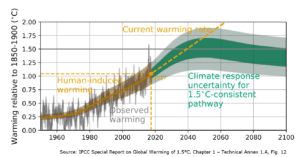“BUT NOW”: A diocese takes action on climate change
This piece is based on remarks I made to the 117th Diocesan Convention of the Episcopal Diocese of Western Massachusetts, asking delegates to pass a resolution entitled “Creation Care in Our Congregations: Living Lightly on God’s Good Earth.” The resolution was created in response to the 79th General Convention, which affirmed the Episcopal Church’s intention, “in the spirit of the Paris Climate Accord,” to make “intentional decisions about living lightly and gently on God’s good earth.” Among other things, the resolution calls on all parishes in the diocese to create a Green Team and to undertake an energy audit. To download the resolution, click here.

I am grateful that the Episcopal Church has named Creation Care as one of the three centerpieces of its attention for the next several years.
You are probably aware of the report issued a few weeks ago by the U.N.’s Intergovernmental Panel on Climate Change. The IPCC report made it clear that planetary warming is well underway, that it is taking place more rapidly and with more extreme effects than scientific models predicted, and that time is running out to avert climate catastrophe.
To stabilize climate change at a 1.5 degree Celsius rise above average global temperatures in pre-industrial times, society worldwide will have to undergo a radical transformation. The IPCC notes that the scale of change that is required to cap global warming at 1.5 degrees is historically unprecedented: never before in human history has our species changed its way of living that dramatically and that fast.
What I want to say is that this is the moment for which the Church was born. We were made for this challenge.
Why?
• Because we put our faith and trust in a God who creates and loves every inch of creation (Genesis 1:1-31);
• Because we put our faith and trust in Jesus Christ, who shares the pain and promise of the human predicament, shows us the path of life, and insists that life and not death will have the last word (John 10:10);
• Because we put our faith and trust in the Holy Spirit, who renews the face of the earth (Psalm 104:31).
I was touched by Bishop Doug Fisher’s convention address, especially his reflection on the power of turning from an old way of living to something new. He mentioned that St. Paul uses the phrase “but now” twenty-seven times in his Letters, as in: “For once you were in darkness, but now in the Lord you are light” (Ephesians 5:8). Once you were in darkness, but now you are light. Once you were dead, but now you are alive. Once you were far from God, but now you are near.
I started playing with that image of turning, and maybe we’re ready to say something like this:
“Once I took nature for granted as something to ignore or exploit, BUT NOW I understand that I must live more gently and mindfully on the earth.”
“Once I thought that climate change was someone else’s problem, BUT NOW I see that everyone must get involved.”
“Once I thought that I could keep going with business as usual and live my life as I please, BUT NOW I understand that business as usual is wrecking the planet and that we must change course fast.”
“Once I depended on fossil fuels, BUT NOW I’ll move as fast as I can to a low-carbon life and do everything in my power to help society make that turn with me.”
The IPCC report tells us that as a global community, we have only 10 or 12 years in which to make that turn. We want to give our children and our children’s children a habitable world. So let’s make a start. I move that we pass this resolution.
I am glad and grateful that our diocesan convention voted to pass the resolution. I look forward to seeing how we will move ahead quickly in the months ahead to honor the God who is making all things new (Revelation 21:5).

4 Responses to ““BUT NOW”: A diocese takes action on climate change”
Dan Breslaw
And I for one am glad and grateful that you are doing this work, Margaret–and doing it in this spirit. To me this is the true meaning of faith.
mbj
Thank you, Dan. I so appreciate your kind support! I am glad that this faith community is moving forward, slowly but surely. I pray that we will build momentum fast. Come, Holy Spirit!
Monica Lewis
Thank you for these excellent points. We, as Christians, are all about conversion! And, yes, we have the Trinity — or, rather, the Trinity has us!
mbj
Amen, sister!